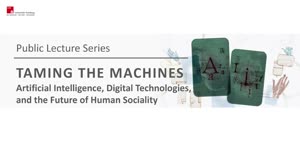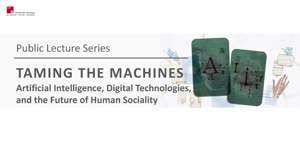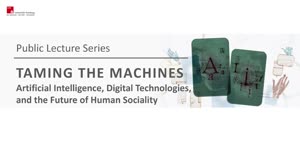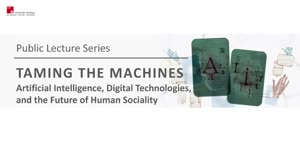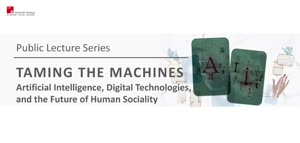Imagining Democracy through the Lens of Learning Machines - Prof. Dr. Jeanette Hofmann - University of Hamburg
- Lecture2Go
- Catalog
- F.6 - Mathematik, Informatik, Naturwissenschaften
- MIN-Fakultät
- Taming the Machines - Artificial Intelligence, Digital Technologies, and the Future of Human Sociality
Catalog
1631 Views
01.11.2022
Imagining Democracy through the Lens of Learning Machines
Jeanette Hofmann (Wissenschaftszentrum Berlin für Sozialforschung (WZB) & FU Berlin, D)
About the speaker:
Jeanette Hofmann, political scientist, is Professor of Internet Politics at the Freie Universität Berlin and conducts research at the Social Science Center Berlin (WZB) on topics such as global governance, regulation of the Internet and the transformation of copyright. She heads the WZB project group ‘Politics of Digitalisation‘, that studies the emergence of new policy fields with an empirical focus on internet politics. She is also one of the founding directors of the Alexander von Humboldt Institute for Internet and Society (HIIG) in Berlin. Jeanette Hofmann is honorary professor of internet politics at the Central Institute of Further Education at the Berlin University of the Arts (UDK).
She is a member of the Leopoldina’s Scientific Commission Digitised Society. From 2010 to 2013, she was an expert in the Enquete Commission ‘Internet and Digital Society’ of the German Bundestag and actively participated in the UN World Summit on the Information Society and the Internet Governance Forum.
In her current publications, Jeanette Hofmann researches the relationship between digitalisation and democracy, the emergence of a policy field of network policy in Germany and the role of trust in the global regulation of the internet.
---
This semester`s edition of Taming the machines explores the positive and negative impacts of artificial intelligence and digital technologies on human sociality. Artificial intelligence (AI) and digital technologies increasingly mediate human interactions and shape our relationships to both ourselves and others. This gives rise to an array of important ethical questions about the future of human sociality: Will AI and other digital technologies provide extended opportunities for community building or individual self-expression, or rather hinder these? How might the radical changes such technologies promise, for example in the workplace, impact these routine spaces of social interaction? Can “trust” or “authenticity”, features important to strong interpersonal relationships and the formation of tolerant societies, find support through such technologies or might they rather threaten these? Are there good reasons to think AI might promote greater diversity in social interactions or provide vital spaces for meaningful and open exchanges of differing viewpoints, or are they likely to exacerbate social isolation, exclusion, and polarization? Might such technology enable greater collective decision making? The list goes on. To explore these and other questions, this public lecture series invites distinguished researchers from philosophy, sociology, social science and political theory to present and discuss their work. To get the latest updates and details how to attend the lectures, please visit http://uhh.de/inf-eit.
---
This semester`s edition of Taming the machines explores the positive and negative impacts of artificial intelligence and digital technologies on human sociality. Artificial intelligence (AI) and digital technologies increasingly mediate human interactions and shape our relationships to both ourselves and others. This gives rise to an array of important ethical questions about the future of human sociality: Will AI and other digital technologies provide extended opportunities for community building or individual self-expression, or rather hinder these? How might the radical changes such technologies promise, for example in the workplace, impact these routine spaces of social interaction? Can “trust” or “authenticity”, features important to strong interpersonal relationships and the formation of tolerant societies, find support through such technologies or might they rather threaten these? Are there good reasons to think AI might promote greater diversity in social interactions or provide vital spaces for meaningful and open exchanges of differing viewpoints, or are they likely to exacerbate social isolation, exclusion, and polarization? Might such technology enable greater collective decision making? The list goes on. To explore these and other questions, this public lecture series invites distinguished researchers from philosophy, sociology, social science and political theory to present and discuss their work. To get the latest updates and details how to attend the lectures, please visit http://uhh.de/inf-eit.
Technical support
Please click on the link bellow and then fill out the required fields to contact our Support Team!
RRZ Support Link

